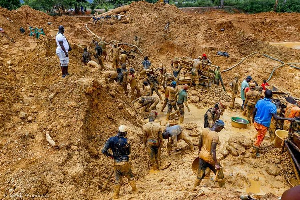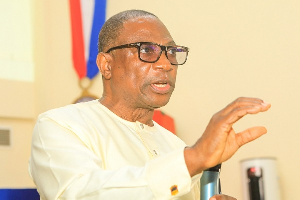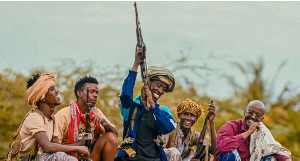Ghana boasts an incredible sixteen regions, and the Western North Region is one of the exciting six newly created areas! This vibrant region is home to around 28 forest reserves, which comprise about 40% of the country's total reserves.
Some highlights include the Krokosua Forest Reserve, Suhuma, Tano Anwia Forest Reserve, and Sui River Forest Reserve. These lush forests play a vital role in cocoa cultivation and are also a sanctuary for various vulnerable species. Isn't that wonderful?
Observing the harmful effects of illegal logging on our precious forests is disheartening. This situation often arises with the complicity of local leaders and individuals who claim to protect these natural wonders. The involvement of foreign actors is particularly concerning.
Allegations suggest that a local chief uses his personal security group, known as "Boko Haram," to protect his interests in the Sayerano, Asempaneye, Agyemandiem, and Pampramase areas. These beautiful landscapes, which are part of the Krokosua Forest Reserve, are crucial to the health of our ecosystem.
This perspective might surprise some. Still, local authorities and traditional leaders are crucial in tackling illegal logging in our region. It's important to emphasize that illegal logging often thrives due to a lack of oversight, such as heavy machinery evading customs regulations or local politicians gaining inappropriate access to our forests.
Upon reflecting on this situation, I wonder if these individuals genuinely understand the harmful consequences of their actions. I want to inform them of their impact on the citizens of Ghana and Western North, as I am unsure whether they can address my concerns.
The adverse effects illegal logging
The most substantial consequence of the illicit logging in our forests is the destruction of habitats for a variety of plant and animal species, which has the potential to bring endangered species closer to extinction.
Furthermore, the overall health of the forest ecosystem is directly impacted by the direct contribution of large-scale tree removal to deforestation and soil erosion. Tree removal without replacement exposes the soil to wind and rain, leading to more significant erosion and land degradation.
Illegal logging has serious consequences, including climate change and water cycle disruption. Forests play a crucial role in regulating water flow, so when logging occurs illegally, it disrupts this natural cycle and affects water availability for local communities.
Additionally, forests act as carbon sinks, meaning that deforestation caused by illegal logging contributes to increased greenhouse gas emissions and exacerbates climate change.
The improper cutting of timber in our forests has significant economic repercussions for both the region and the country. It negatively impacts various economic sectors, including government resources, responsible logging companies, and Indigenous communities.
Illegal loggers who operate without proper permits evade taxes and fees, depriving the region of essential revenue. As a result, responsible timber companies face decreased market demand and price pressures because illegal timber can be produced at a lower cost.
Additionally, this economic crime adversely affects local communities. For instance, communities in the Krokosua Forest Reserve, Suhuma, Tano Anwia Forest Reserve, and Sui River Forest Reserve depend on the forest for their livelihoods, including subsistence farming and ecotourism. The loss of these forest resources and illegal mining activities has led to decreased agricultural productivity, worsening poverty.
The illegal logging activities in these forest reserves often result in conflicts between local communities, logging companies, and government authorities.
Recently, the residents of Sefwi Sayerano in the Juaboso District clashed with illegal loggers who were being protected by police or private security. During this confrontation, two community members sustained gunshot wounds, and the community had to raise funds through voluntary contributions to cover their medical treatment.
One significant impact of illegal logging is on the region's security and the nation. Research has shown that illicit timber trade can fuel conflict and instability by providing resources for violent actors and promoting corruption.
During the civil conflict in Liberia, timber trafficking was one of warlord Charles Taylor's principal means of financing. It also facilitated Taylor's support of the Revolutionary United Front in the adjacent Sierra Leone.
When the Seleka rebel coalition took over the Central African Republic in 2013-14, international timber merchants paid them at least 3.4 million euros in protection fees to continue harvesting and exporting operations.
This reinforced the insurgents' presence and facilitated arms trafficking. After the Seleka relinquished power, Anti-Balaka militias were reportedly paid for protection. In the DRC, the Allied Democratic Forces and several other militant groups in the east have been involved in the illicit forestry trade, which functions as a conflict financing mechanism.
Measures to Oppose Illegal Logging
One measure that can effectively counter illegal forestry is for the government to enact and enforce strong forest protection laws with defined penalties. This necessitates the government's rigorous enforcement of the Forest Conservation and Wildlife Protection laws.
The government and the Regional Security Council must deal harshly with offenders, mainly traditional authorities and public officials who are implicated.
Traditional authorities who are captured in the act must be destooled, and politicians and public officials who are involved must be forced to relinquish their positions, if feasible. The government must imprison such individuals, impose severe penalties, or seize the equipment involved in this environmental crime to deter future offenders.
An additional approach to permanently resolving the issue is for the government to provide assistance or empower local communities to monitor and report illicit forestry activities.
Indigenous communities are recognized for their social, economic, political, and spiritual connections to forests. To guarantee the survival of their forest, they implement sustainable agriculture, traditional knowledge, and resource management. The communities will not hesitate to risk their lives to protect their most cherished asset, as they know their livelihoods are contingent upon the forest.
It is also imperative that the government and the regional Security Council encourage whistle-blowing. This measure guarantees that essential information is communicated to the appropriate individuals.
Disseminating the proper information to the relevant individuals will facilitate the practical and efficient combat against this act. This will assist the Security Council and Forest Guards in identifying and apprehend the perpetrators.
The role of the youth in the fight against illegal logging in the region
The campaign against forest degradation in the Western North Region will only be effective if the region's youth actively participate. They should oppose illegal logging by raising awareness through social media campaigns, engaging in conservation initiatives, and advocating for community rights.
The region's youth can promote awareness by sharing information about the consequences of illegal logging and the importance of forest protection on social media and other communication platforms.
They must launch social media campaigns and organize awareness events. Additionally, the region's future leaders can advocate for the rights of local communities and marginalized groups, ensuring equitable access to natural resources and promoting inclusive conservation initiatives.
Furthermore, the youth should attend community forums and meetings to voice their concerns about illegal logging. They can also meet with officials to call for stricter legislation and enforcement against illegal logging and deforestation.
Individuals participating in this act must remember that forests are essential carbon sinks for mitigating carbon dioxide emissions and other greenhouse gases.
Additionally, they provide diverse ecosystem products and services, such as carbon cycling, socio-economic development, livelihood security, ecosystem functioning, climate, biodiversity preservation, and nutrient cycling.
Let's spread the exciting news across Ghana and our vibrant region that trees genuinely transform our communities! Imagine mornings filled with cheerful birdsong and refreshing shade. Trees are beautiful and essential to our lives, acting as the lungs of our planet and enriching our culture.
Without them, our land would lose its spirit and vibrancy. Let's come together to celebrate and protect these incredible gifts of nature, creating a lively and thriving environment for future generations!
Together, we can nurture our green companions and embrace their joy in our lives!
Opinions of Wednesday, 12 March 2025
Columnist: Kwame Aduhene-Kwarteng















